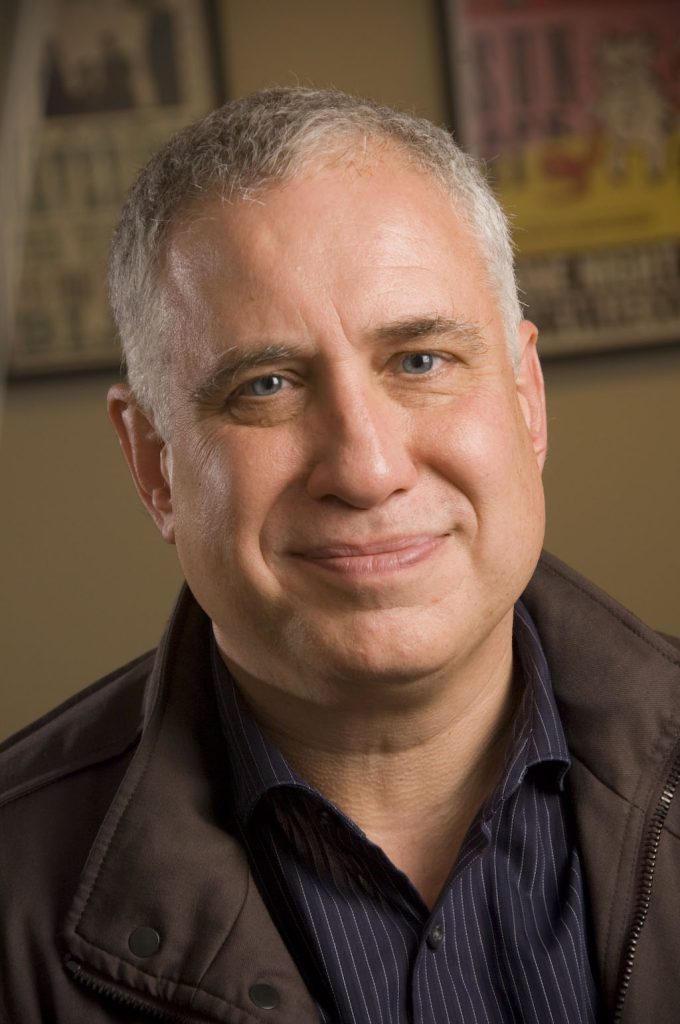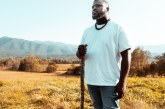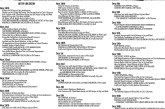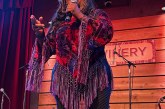
The continuing sonic adventures of Ashley Capps culminates in the biggest big ears yet
Big Ears Guide • Ashley Capps interview • Madame Weezy’s Big Ears Horoscopes
It’s not difficult to imagine Ashley Capps as Harrison Ford’s intrepid Indiana Jones, traveling to far-flung locales in search of musical treasure.
Like Dr. Jones, Capps – the founder of AC Entertainment – doesn’t seek to acquire personal riches. The artists he discovers, he believes, deserve to be appreciated by broader audiences – both for the music they make and for the emotions said music evokes. That’s been his passion since he got his start booking shows around Knoxville in the 1970s, but it’s only with Big Ears Festival, celebrating its 10th year beginning March 31, that he’s managed to create something truly boundless, limited only by the size of venues and the complexity of touring schedules.
Nothing else, he tells BLANK Newspaper, is off the table. And like the venerable explorer of the big screen, accomplishing his mission may result in pyrotechnics far beyond his anticipation or expectation, but they only serve to make a more enjoyable experience for the denizens of the city at the center of it all.
“To me, the real spirit behind the festival is fun,” Capps says. “One of the motivating principles behind the festival is to take music that sometimes exists only in a certain environment and bring it into a new environment to mix it up with certain other things. I love bringing together these audiences and communities that don’t necessarily always meet each other but are coming together to share their passion for the music they love.
“Those connections, collisions and conversations that come from bringing together people who don’t normally spend time together is the most exciting thing about the festival to me, and music is the spark that pulls all that together.”
Straight outta Fountain City
He probably wasn’t wearing a fedora or a bullwhip, but it was in Cali, Colombia, that Capps procured two of the acts for Big Ears Festival 2023. Part of a musicology excursion to the South American city to study the sounds of the region, he found himself among a contingent of music lovers as enthusiastic about sonic exploration as he’s been his entire life, and one of them happened to be sporting a T-shirt of a band he’d never heard of before: Combo Chimbita, a group from Brooklyn with Colombian roots.
“For that week of talking to people, bands came onto my radar screen – wonderful, incredible bands – that I really did not know much about before then,” he says. “Bands like Combo Chimbita and the Meridian Brothers, both of which are playing this year’s festival. That’s part of how the process comes about. I ultimately choose the artists and bands that are performing at the festival, but it’s not because I’m a rabid fan of all the artists.
“I am of many, and perhaps even most, but it’s also about exploring ideas. For me on the fan level, so to speak, a lot of these conversations lead me to discover new things I didn’t know myself, even. It’s this ongoing process of discovery I have, in which something I love will lead me to another artist, to another artist, to another project.”
Credit that to an adventurous spirit that’s seems to have been written into Capps’ DNA. Sure, he loved popular music, but he wasn’t just a listener. His consumption was a total-body experience, from tracing his fingers across the covers of vinyl albums to studying every word of the liner notes to seeking out interviews – no easy feat before the advent of the internet – of musicians and bands he loved, and then digging into the influences they credited with their sound. It’s a cliché championed by angst-ridden teens since it spoke to their rebellious spirits, but to Capps, music was life. It was a film, however, that showed him it could also be a living.
“As a kid, my father took me to see the ‘Woodstock’ movie,” he says, referring to the groundbreaking and award-winning 1970 documentary directed by Michael Wadleigh. “I must have been 14 when that movie came out, but I still remember it vividly, and I watched it again not long ago. It’s this tri-screen thing, just this amazing music film, and the atmosphere and the vibe that surrounded Woodstock [the festival] was something that, as a young man far too young to experience it, was inspirational.
“It was fascinating, the whole idea of a community coming together and creating this city really all built around the experience of music. That was the thing that attracted me to festivals from a very young age and really stayed with me through the years. There was something about the festival experience that was interesting to me.”
Capps’ rise through the ranks of Knoxville concert promotion began rather inauspiciously. He was still attending Central High School and growing up in Fountain City when he applied for a program position at WUOT, the venerable NPR affiliate that remains on the forefront of music made in the well of creativity that he finds most exciting. That led to his own show, “Unhinged,” which provided him a platform to share with a much bigger audience the sounds about which he was passionate.
“Back in those days, Rolling Stone magazine was a real touchstone for music journalism. You could read about the big bands of the day, but you could also read about artists like Sun Ra and John Coltrane, and great writers like Bob Palmer really turned people like me on to all of these acts,” Capps says. “For anyone who was interested in paying attention, there were many, many roads to follow there, and once I spent some time in New York in the 1970s, I discovered even more because there it wasn’t even really an effort.
“For people who had their antennae out and were attuned to it, there was just this extraordinary world of music. Back then, I was approaching it all as a fan, not really thinking about what I was going to do with it, and then that became a radio show in 1979. For the 20 years ‘Unhinged’ existed, it was the prototype of Big Ears, because it brought together all these different types of music and explored all these tangents and similarities and so on.”
Music advocacy, of course, isn’t the same thing as music promotion, which became a career path almost by accident. He found out too late about a show by jazz artist Evan Parker that he wanted to attend, but the organizers of the concert took down his name and number. A few months later, they called him up to let him know that cellist Tristan Honsinger would be coming through Knoxville, and hey, did Capps want to find him a venue?
Experience aside, Capps relied on his innate sense of musical direction and rented out the Laurel Theater in Knoxville’s Fort Sanders neighborhood. The show sold out, and by 1988, he had his own place – Ella Guru’s, located in the Old City space now occupied by The Melting Pot – which for three years became a focal point of cutting-edge music and a launchpad for up-and-coming artists. Béla Fleck and the Flecktones played their second-ever show at Ella Guru’s, and a then-struggling country singer named Garth Brooks came to the venue on one of his first trips out of Nashville. (He would give the place a shout-out a few years later, in a song called “The Old Stuff” from his 1995 album “Fresh Horses.”)
“Ella Guru’s was in 1988, ’89 and ’90, and then AC Entertainment was launched in 1991,” Capps says. “That’s when we started doing shows all over the Southeast and started working with Dylan and Willie Nelson and bands like Widespread Panic. We also did the Hot Summer Nights [a concert series held in World’s Fair Park that was a precursor to Sundown in the City], which gave us the experience of building something from scratch, which in some ways led to the willingness to take on a project like Bonnaroo. It wasn’t necessarily pretty to watch, but the ’90s was the transformative era.”
Scattering the Big Ears seeds
Capps can’t point to a singular seed from which Big Ears Festival sprouted. It’s safe to say he was scattering them around downtown Knoxville along the way to its 2009 launch, with projects like Sundown in the City and management and booking of the Tennessee and Bijou theaters. Those venues, he adds, allowed him to continue to bring jazz and other niche, non-mainstream acts to town, but the problem, he says, was that attendance lagged behind the enormity of the performance.
“These were some really great, internationally renowned artists, but we were having trouble attracting the type of audience in Knoxville that they deserved,” Capps says. “When we were trusted with programming these theaters, part of the impulse was to create an environment where we could not only book these artists but book them successfully and have full venues.
“At the same time, we also recognized that the music not necessarily on a lot of people’s radar screens was actually very influential to the artists they love. It appeared in their music, and it would influence ideas and textures, whether it was Radiohead or DJ Shadow. I loved that because I was always like, ‘I know that music!’ But it became interesting after [launching] Bonnaroo as we started thinking of festival concepts and how these tangible influences came together to make music that’s really popular but that fans might not be aware of where it came from.”
Some of those influences, certainly, are obscure ones. Others, however, just aren’t as on the nose as contemporary audiences realize. Béla Fleck and Del McCoury aren’t exactly unknowns, but fans of String Cheese Incident may not realize how much those two individuals have influenced the band they love. And that, Capps adds, became the flicker of the Big Ears spark.
“I started a lot of conversations with artists, some of whom thought I was crazy,” he says with a chuckle. “I remember having a conversation with Sonic Youth in their dressing room at the Bijou and talking about this festival idea. My wife is European, so I was always traveling there a lot and experiencing all those different festivals in Europe. Every city, it seems, has multiple music festivals, no matter how big it is, and they’re festivals of all kinds. I remember one really tiny town in Germany where they had a Texas country music festival – almost without any Texans, but the German musicians were doing their best to capture the spirit.”
It was in 2008 that Capps returned from one such trip to Europe with a desire to do something similar in Knoxville. He called up Jason Boardman, a booking and promotion heir apparent to Capps’ appreciation of the offbeat aesthetic if there ever was one, and wanted to meet. The Pilot Light, which Boardman had co-founded, tapped into the same sense of adventurousness with its acts that fueled “Unhinged,” and along with Steve Greene – Capps’ contemporary at AC Entertainment at the time – they began hammering out details in a whirlwind fashion.
“It was late, like October or November of 2008, and I had just come back from Europe and seen a couple of festivals there, and I said, ‘Why don’t we just do it?’” he recalls. “So Jason and Steve and I sat around the table, and we just threw ideas across it. Somebody mentioned Philip Glass, and I walked into my office, called my friend who works with Philip, and he said, ‘Sure, he can do that.’ I had been talking with Jon [Hassell] about coming and giving a live performance, and then somebody suggested Pauline Oliveros, and Michael Gira from Swans, and we put it together on literally three months’ notice.
“We cobbled it all together at the last minute, and it was much, much, much smaller than Big Ears is now, but it still captured a lot of people’s imaginations. That was the real spark, and then the next year, we had The National and Vampire Weekend and The xx, but we also had Terry Riley, and it grew really fast, and we still hadn’t figured out the formula. We were trying to sell tickets to individual concerts, which really hampered the ability to create a festival feel because people chose what they knew and didn’t try anything else, and that was not the spirit in which the festival was created.”
A pause and a resurrection
In addition, AC Entertainment hit a pace that quickly took over all available mental bandwidth Capps and his team had available. Moogfest, in Asheville, took precedent in 2010, 2011 and 2012, but during that fallow period, the planners retooled the concept and returned in 2014 with a festival that was groundbreaking in scope, breathtaking in beauty and awe-inspiring for locals, of course, but also for the thousands of people who have traveled to East Tennessee over the years to take part. (Save, of course, for 2020 and 2021, when COVID forced its cancellation.)
“We came back with a bang, and ever since, it’s grown 20 to 25 percent every year,” Capps says. “Last year, it grew by 35 percent, and this year, it could end up growing by 50 percent, which is just extraordinary momentum at this point.”
And in both reining in the festival’s runaway growth from year one to year two, while at the same time expanding outward in terms of adventurous programming, Capps has created something that has defied expectations – both musically and geographically. Knoxville, after all, seems like an odd place for such a cosmopolitan event, but for Capps, it remains the perfect setting. The blueprint of downtown venues – both long-established ones, like the Bijou and Tennessee theaters, and newer ones like the Mill & Mine – offer a walking tour of sorts that turns the city center during Big Ears weekend into a bazaar of cultural collisions, which is exactly what he had in mind from the beginning.
“It’s a rare thing for a community the size of Knoxville to have the array of venues it has, period, but especially all within walking distance of each other,” he says. “Now you add in the restaurant scene downtown, which gets better and better and better – and now we have a robust hotel community, as well – and you can see how it’s all really grown together and helps to create this environment. At the same time, the city has retained its Southern historic character, and I think that adds to the whole dimension, as well.
“Being in Knoxville in terms of what the city offers, in terms of the infrastructure it presents, is really important. Knoxville isn’t necessarily known as being a cultural center – at least, it wasn’t – so in the beginning, it was confusing for people who wanted to know why it was happening here. But the reality was, because it was happening here, it was actually able to develop a profile and able to have an impact here that would be very difficult to have in a major city where there’s a million shows going on every night.
“Being in Knoxville allows it to have a presence and a profile that would be very difficult to replicate in many of the traditional culture centers,” Capps adds. “It’s an interesting little confluence of various factors, which adds up to what so far is something of a perfect storm.”
One that Capps, drawing on his lifelong pursuit of off-the-beaten-path sounds and his career as a savvy promoter with plenty of success and a lot of lumps from what didn’t work, has seemingly conjured from the ether, the metaphysical cosmic stew where the mountains meet the city and artists big and small find a place of respite and creativity as they cross the country on interstates traveling east-west and north-south. He and his team – because while he’s in the captain’s chair, he doesn’t claim sole responsibility or ownership – have managed to capture lightning in a bottle, he adds, and from the very beginning, they didn’t know if it would shine like fireworks or explode into shrapnel.
“You might think you have a good idea, but you can’t control how people respond to it,” Capps says. “Sometimes an idea will gain traction, and sometimes they won’t, but with this one, for whatever reason, it was clear we touched a nerve of inspiration, of sorts, from the very beginning. People were responding very curiously, positively and eagerly to something that was really different from anything else going on in the United States, and to keep doing it has been really amazing to figure it out.
“It was a unique idea, very out-of-the-box and a head-scratcher for most people. Exactly how many people might embrace the concept was difficult to determine, and there was no way of knowing it in advance. But the thing that struck me from the very beginning was how many people traveled to Knoxville for that experience.”
That they come here and fall in love with the city is a byproduct of the transcendent moments they share together, as a community and as fans of both the artists they know and the ones they discover for the first time at Big Ears. As enthusiastic as Capps is to hear the ones with which he’s intimately familiar, he’s even more excited to introduce them to those seeing them live for the first time. Whether it’s a longtime fan fulfilling a dream or a sonic adventurer who reminds him of his younger self, it’s hard not to be moved, he says, when he sees Big Ears attendees moved to tears.
In that sense, he shares another trait with the famous archaeologist of the big screen: Often making it up as he goes, getting a little help from trusted friends and fellow adventurers, and believing that the journey is as rewarding, if not more so, than the destination.
“We were doing it for the thrill of doing it,” Capps says. “So the expectations were very interwoven with a genuine sense of curiosity ourselves: ‘If we do this, what’s going to happen?’ And merely the fact of bringing together legends like Philip Glass and Pauline Oliveros and Jon Hassell all to Knoxville for a little weekend was kind of a pinch-me moment for people tuned in to those artists.
“I think the magic chemistry of Big Ears is that we’ve been able to attract a large audience from all over the country, which results in a significant audience for these artists that goes beyond the norm. It’s not just the size; it’s an audience that’s knowledgeable, appreciative and very passionate about the music and the experience, and that’s the secret sauce. It’s a special brew, and artists immediately recognize that and very much embrace the experience.
“And it really pushes the artists to extraordinary heights in their performances most of the time,” he adds. “It’s just an incredibly symbiotic relationship that creates a really exhilarating weekend.”
wildsmith@blanknews.com







